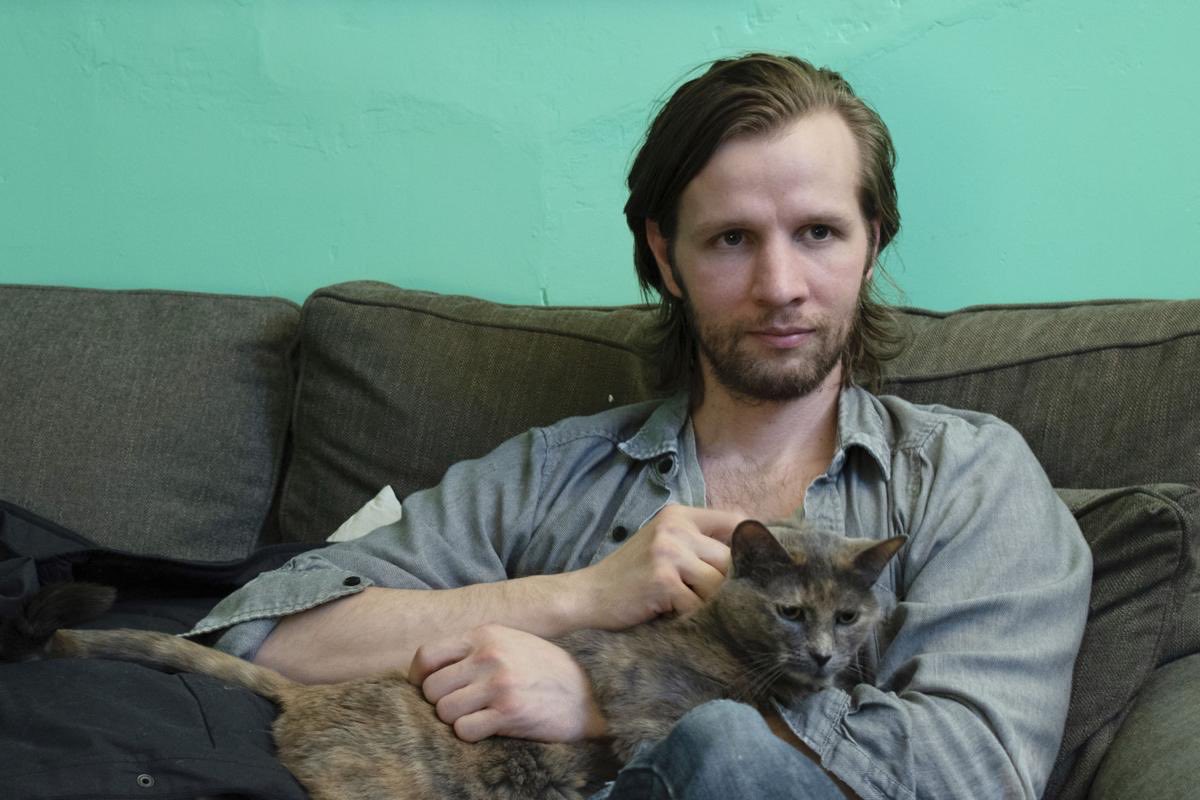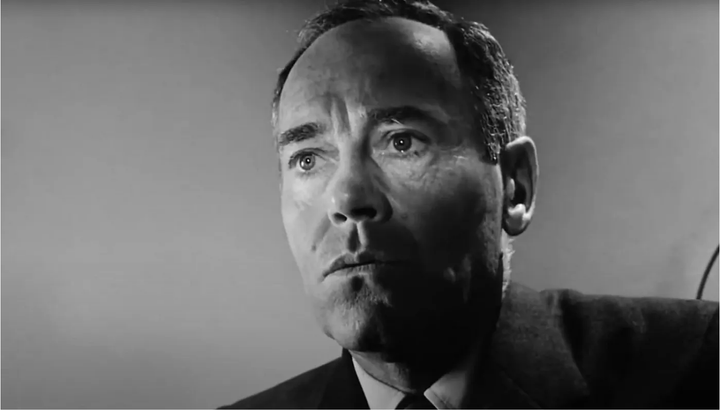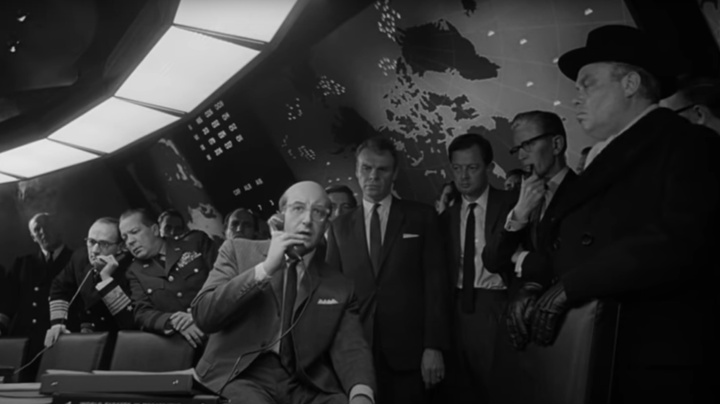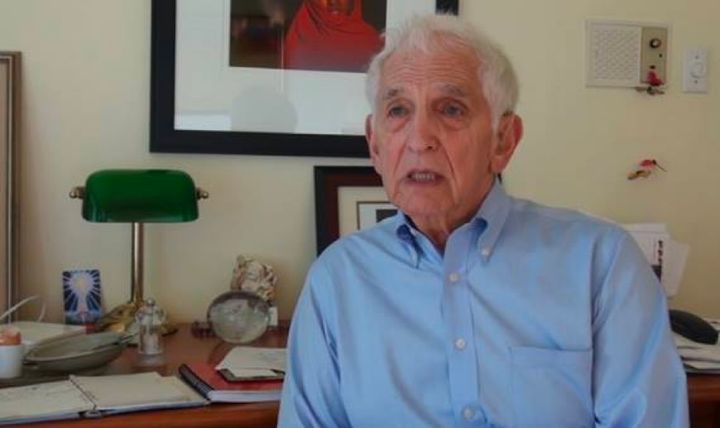Imprisoned Drone Whistleblower Daniel Hale Honored By International Free Speech Group
Blueprint For Free Speech also gives Pentagon Papers whistleblower Daniel Ellsberg a lifetime achievement award. He celebrated Hale as a "great patriot."

Drone whistleblower Daniel Hale, who is serving a federal prison sentence in the United States, received a whistleblower award from the Blueprint for Free Speech, an international non-profit group based in Australia that promotes freedom of expression.
The organization also awarded Pentagon Papers whistleblower Daniel Ellsberg a lifetime achievement award, and while accepting the prize, he called Daniel a “great patriot” who should be celebrated just like his ancestor Nathan Hale, who was hanged by British soldiers for giving secrets to colonists during the American Revolution.
Ellsberg said Hale risked a life of freedom like many U.S. whistleblowers in the past few decades. He shined a light on the scale of innocent civilians killed by U.S. drone warfare.
“It’s absurd, of course, from any sense of any rule of law, that you should be imprisoned for revealing criminality by your government or anyone else,” Ellsberg declared.
Accepting the award on Hale’s behalf was Noor Mir, a close friend and member of his support team.
“Daniel is very humbled and grateful to be receiving this award today. I know that if Daniel was here in person he would obviously have a lot more to say,” Mir declared. “But considering the nature of his incarceration, as a member of his support team and as his friend, we hope that this award actually encourages other people that know the truth about crimes that are being committed by governments, about atrocities that are happening in the world, to tell the truth.”
“Know that you are joining a community of other brave people that are really making a difference and inspiring future generations to do the same,” Mir added.
Hale was a signals intelligence analyst in the U.S. Air Force. He was deployed to Afghanistan and stationed at Bagram Air Base. He later worked as a contractor for a firm known as Leidos. His contracting job gave him access to documents on the drone program, and he shared copies with journalist Jeremy Scahill, who published the documents at The Intercept.
He pled guilty to one count of violating the Espionage Act on March 31. Authorities subsequently jailed him after his therapist ratted him out, and Hale was sentenced to 45 months in prison on July 27.
Hale is the first person convicted of an unauthorized disclosure of information to the press to be incarcerated in a Communications Management Unit (CMU), which the Bureau of Prisons (BOP) claims is for terrorists and “high-risk inmates.”
“There are many civil and human rights groups that are actually pushing for the CMUs to be dismantled. The one that Daniel is in is actually called ‘Little Guantanamo’ because of the fact that it was the place where a lot of Muslim Americans were sent post-9/11, and we were surprised. He was surprised to be sent there as well,” Mir shared.
Mir continued, “He is doing as well as he can. His communications, as is the nature of the unit, are severely limited. So for the past two months, he has been only able to contact me, which you know is not great. He should be able to talk to all of his loved ones, all of his friends and family. While he is in a CMU, he is allowed two 15-minute calls a week and all contacts have to be authorized by the Bureau of Prisons. So it’s a long and arduous process.”
“In addition to that, compared to other places where he could be incarcerated, all phone calls are live-monitored by the FBI, and his letters or any other reading material that is sent to him is also scanned.
“There’s definitely a higher threshold of what he is able to receive and what he is able to put out,” Mir concluded. “I know that if he was not in a CMU he would have been able to issue a public statement, but because of the nature of his incarceration and the Bureau of Prisons’ decision, he is unable to do that."
Presenting the award, Lady Sue Woodford-Hollick, one of the prize judges, stated, “What Hale disclosed has cast invaluable light on the administrative structures that underpin the U.S. drone program and also the moral injury experienced by those involved in it.”
“Hale has publicly exposed a secret unaccountable process for using technology to target and kill people around the world. When he was sentenced to 45 months in prison in July this year, Hale told the courtroom, ‘I believe that it is wrong to kill, but it is especially wrong to kill the defenseless.’”
She continued, “The truth of Hale’s revelations echoed again as the U.S. was pulling out of Afghanistan in August. The U.S. sent a drone to bomb alleged terrorists, an action they called a righteous strike. But the strike was wrong.”
“The drone killed 10 innocent civilians, including seven children. The target whom the U.S. military claimed was working with ISIS, was in fact a longtime aid worker for a U.S. charity. This final act of the U.S. occupation of Afghanistan illustrates exactly why Daniel Hale should be released from prison, and his convictions overturned,” according to Woodford-Hollick.
Ellsberg said it was essential to stop using the Espionage Act as if it is a British Official Secrets Act.
Asked if the climate is more restrictive and harder to operate than the climate in which he blew the whistle fifty years ago, Ellsberg replied, “The government lying is pretty much the same now as ever, I’m sorry to say.”
But Ellsberg contended, “The prosecution of people to keep the secrecy is what has changed. That’s an attitude by the executive branch, and especially since 9/11.”
"As I’ve been saying for decades now to people who are in the position I was in with access to documents of lies, crimes, deceptions, wrong predictions, foolish policies, don’t do what I did," Ellsberg urged. "Don’t wait til the bombs are falling or thousands more people have died before you consider going to the press."
*
Hale received the Blueprint for Free Speech’s international prize. A U.K prize and a few special recognition awards were presented by the organization as well.
Francois van der Westhuizen, Pieter Snyders and Paul Hopkins were awarded the U.K. prize for “blowing the whistle on British American Tobacco’s [BAT] dirty tricks in Africa.”
“In two separate whistleblowing instances,” Woodford-Hollick declared, “Paul in Kenya, and then Pieter and Francois in South Africa, presented evidence that British American Tobacco engaged in a consistent campaign of industrial espionage and sabotage against its rivals on the African continent. These activities were condoned by BAT and sometimes conducted out of their London headquarters.”
Another wave of allegations from thousands of leaked documents about BAT were reported by the BBC and the Bureau of Investigative Journalism (TBIJ), and the University of Bath in 2021.
“The documents illuminated a shadowy world of spies and smugglers who had operated within southern Africa’s sometimes violent tobacco market, primarily between 2012 and 2016. BAT says its actions were lawful, and all in the name of clamping down on illegal cigarette trading,” according to TBIJ. “Yet former BAT agents have claimed the company sabotaged competitors, infiltrated law enforcement agencies, paid bribes, and carried out surveillance.”
While the U.K. government apparently investigated disclosures from as early as 2015, the government’s Serious Fraud Office closed their investigation into BAT in January without issuing any charges.
The whistleblowers who exposed BAT faced retaliation. For example, in South Africa, Westhuizen survived threats of violence against his family and an attempt to kidnap his wife.
SBM Offshore whistleblower Jonathan Taylor, a British citizen, was also awarded the U.K. prize. He was a lawyer at the company and revealed how SBM routinely engaged in bribery as part of business.
His disclosures led to multi-million dollar fines against SBM by the U.S., Netherlands, and Brazil governments. SBM executives were convicted of fraud-related offenses. But as Woodford-Hollick described, “Taylor has experienced significant harm.”
“When he arrived in Croatia for a family holiday last year, he was suddenly arrested on an Interpol ‘Red Notice’ and restrained there and isolated from his family. Monaco requested his extradition from Croatia in a retaliatory legal attack. Despite several appeals to the British government, Taylor was only able to leave Croatia [in July 2021] when the justice minister formally rejected Monaco’s extradition request.”
“Extradition requests and Interpol red notices are increasingly being used as political tools to silence whistleblowers, and there are few if any protections against this type of retaliation,” Woodford-Hollick stated.
Special recognition awards went to Margaret Mitchell, a whistleblower who was part of Google’s artificial intelligence research team; Pav Gill, who was a lawyer for Wirecard who exposed fraud, Babita Deokaran, who was assassinated for challenging corruption in the health department of South Africa’s Gauteng Province; and Thabiso Zulu, a South African who is in hiding after speaking out against vast corruption, including “politically motivated killings of activists by politicians.”




Comments ()